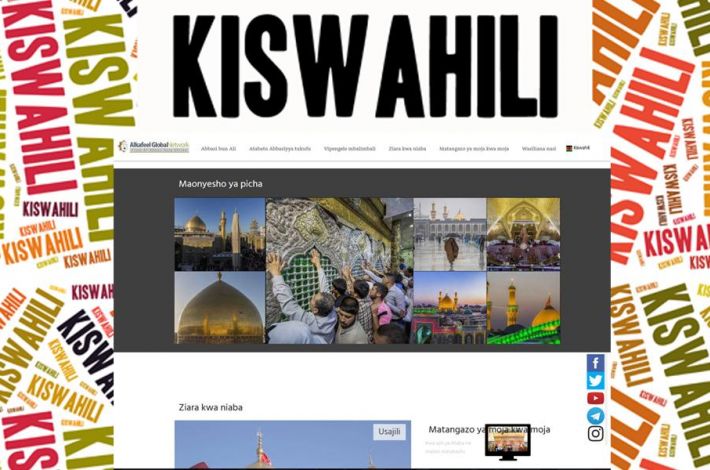The Internet Division of the Intellectual and Cultural Affairs Department at the Al-Abbas's (p) holy shrine, has announced the launch of its new website in Swahili language to be added to its other websites in the following languages: English, Persian, Turkish, Urdu and French in addition to Arabic. So this new website is a window of the Al-Abbas's (p) holy shrine to the residents of the eastern regions of Africa and all the native speakers of this language in the world, which is one of the imperatives of the openness and communication with the people.
The website, which was opened due to the urgent need to introduce the Al-Abbas's (p) holy shrine and to make it resonate in various places, is managed by specialized cadres and includes many pages such as the news, the Ziyarat by proxy, the Photo gallery, videos, Friday sermons in addition to the projects of the holy shrine, depending on the themes that fit with the website's browser.
The website programming was performed by the technical cadres of Internet Division, using the best ways of programming websites. The technical staff was keen to make the website's data easy to use and browse. And it is possible to browse the new website in Swahili language by clicking on the following link:
https://alkafeel.net/?lang=sw
It is to mention that the Swahili, also known as Kiswahili, is a Bantu language and the first language of the Swahili people. It is a lingua franca of the African Great Lakes region and other parts of eastern and south-eastern Africa, including Tanzania, Kenya, Uganda, Rwanda, Burundi, Mozambique and the Democratic Republic of the Congo. It is the mother tongue of more than fifteen millions people and some 50 million are learning it. Swahili serves as a national language of three nations: Tanzania, Kenya, and the Democratic Republic of the Congo. Swahili is also one of the working languages of the African Union and officially recognised as a lingua franca of the East African Community. A significant fraction of Swahili vocabulary is derived from Arabic through contact with Arabic-speaking Muslim inhabitants of the Swahili Coast. It has also incorporated German, Portuguese, English, Hindustani and French words into its vocabulary through contact with empire builders, traders and slavers during the past five centuries. The language used to be written in the Arabic script but now is written in Latin letters.


